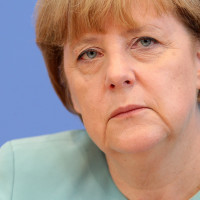German chancellor Angela Merkel has relaxed restrictions on deporting foreign criminals after an unprecedented wave of mob sex assaults in Cologne and other cities.
On Tuesday (January 12) the Justice Ministry announced new measures to allow it to more easily deport migrants found guilty of crimes causing death or serious injury, sexual or physical assaults or resisting police officers. Previously, migrants to Germany could be deported only if they were found guilty of crimes punishable by a sentence of one year or more.
Large numbers of women reported being sexually assaulted or robbed by gangs of men of Arab or North African appearance during celebrations in Cologne’s city centre on New Year’s Eve. A police spokesperson said there had been 553 criminal complaints stemming from that night, about 40% of which relate to sexual assaults.
At least 31 people, most from North African or Middle Eastern countries, have been charged so far over the attacks, police say. Of those, 18 have been identified as asylum seekers. Other European cities reported a similar slew of sex crime reports on New Year’s Eve.
The assaults have fuelled the already heated debate over immigration in Germany, which has taken in the bulk of migrants, creating a crisis on Europe’s borders and sparking furious protests around the country. A rally organized by a chapter of anti-Muslim organization PEGIDA saw protesters march through the streets of Leipzig, a city in eastern Germany, on Monday night, blaming the sex assaults on migrants.
Some chanted “Deport them!” while others waved signs demanding that refugees be sent home. “Rapefugees not welcome,” read one banner, which showed a silhouette of a woman running from a mob. Another sign read “Islamists not welcome,” while yet another depicted Chancellor Merkel being groped.
A Leipzig police spokeswoman told TV news reporters that police had surrounded at least 250 right-wing extremists after some local businesses were ransacked. Many wore face masks to shield their identity, which is against the law in Germany, she said.
Nearby, counter-demonstrators came out in force to show their support for the refugees. One banner read, “Willkommen in Leipzig” — Welcome to Leipzig.
The protests took place as police in neighbouring Austria revealed that Germany has been sending an increasing number of migrants back to Austria after the attacks, most of them from North African countries.
David Furtner, a spokesman for the Upper Austria Federal Police, said that since December, Austria and Germany had had a “memorandum of understanding” that they would turn back a maximum of 60 migrants per day. But since the start of the year, the number of migrants turned back had increased to up to 200 a day.
He said that only a small number of Syrians were among those turned back, with the majority hailing from Algeria or Morocco, and some from Afghanistan.
Furtner said he did not have details on where the migrants went next, saying some may try to re-enter Germany, while others probably sought asylum in Austria.









